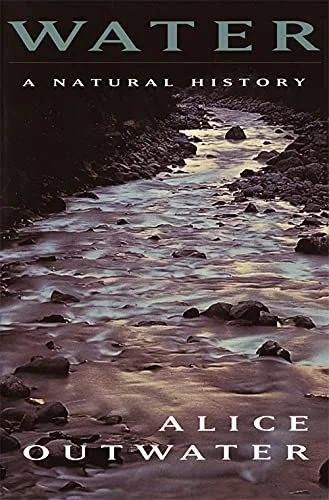Alice Outwater
Alice Outwater has been writing about water and the environment for over thirty years. She grew up on Lake Champlain, in Vermont, and studied engineering at the University of Vermont. She went to grad school at MIT to learn about water, where she won the prize for Best Thesis in Technology and Policy.
Outwater managed sludge for the Boston Harbor Clean-Up and wrote The Reuse of Sludge and Minor Wastewater Residuals. She wrote the much translated Cartoon Guide to the Environment with Larry Gonick. Water: A Natural History was a Library Journal Science Book of the Year, a finalist for the PEN/New England award and was reviewed in the New Yorker.
Water: A Natural History
An environmental engineer turned ecology writer relates the history of our waterways and her own growing understanding of what needs to be done to save this essential natural resource.
Water: A Natural History takes us back to the diaries of the first Western explorers; it moves from the reservoir to the modern toilet, from the grasslands of the Midwest to the Everglades of Florida, through the guts of a wastewater treatment plant and out to the waterways again. It shows how human-engineered dams, canals and farms replaced nature's beaver dams, prairie dog tunnels, and buffalo wallows. Step by step, Outwater makes clear what should have always been obvious: while engineering can de-pollute water, only ecologically interacting systems can create healthy waterways.
Important reading for students of environmental studies, the heart of this history is a vision of our land and waterways as they once were, and a plan that can restore them to their former glory: a land of living streams, public lands with hundreds of millions of beaver-built wetlands, prairie dog towns that increase the amount of rainfall that percolates to the groundwater, and forests that feed their fallen trees to the sea.
Wild at Heart
"Alice Outwater’s infectiously readable Wild at Heart captures the essence of ecology: Everything is connected, and every connection leads to ourselves." ―Alan Weisman, author, The World Without Us and Countdown
"A wonderful book. Information rich to say the least, and the indigenous human connections and portrait of the deep connectivity of nature, are both strong elements." ―Jim McClintock, author of A Naturalist Goes Fishing
Nature on the brink? Maybe not. With so much bad news in the world, we forget how much environmental progress has been made. In a narrative that reaches from Native American tribal practices to public health and commercial hunting, Wild at Heart shows how western attitudes towards nature have changed dramatically in the last five hundred years.
The Chinook gave thanks for King Salmon's gifts. The Puritans saw Nature as a frightening wilderness, full of "uncooked meat." With the industrial revolution, nature was despoiled and simultaneously celebrated as a source of the sublime. With little forethought and great greed, Americans killed the last passenger pigeon, wiped out the old growth forests, and dumped so much oil in the rivers that they burst into flame. But in the span of a few decades, our relationship with nature has evolved to a more sophisticated sense of interdependence that brings us full circle. Across the US, people are taking individual action, planting native species and fighting for projects like dam removal and wolf restoration. Cities are embracing nature, too.
Humans can learn from the past, and our choices today will determine whether nature survives. Like the First Nations, all nations must come to deep agreement that nature needs protection. This compelling book reveals both how we got here and our own and nature's astonishing ability to mutually regenerate.



